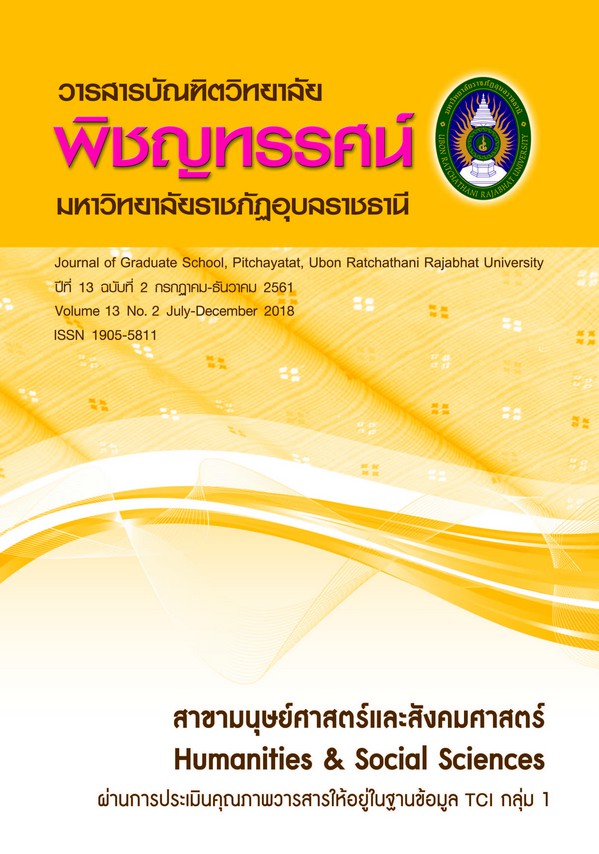ค่านิยม 4.0: กลไกขับเคลื่อนการบริหารองค์การภาครัฐแนวใหม่ กับการก้าวสู่ประเทศไทย 4.0
คำสำคัญ:
ประเทศไทย 4.0, การจัดการภาครัฐแนวใหม่, ค่านิยมบทคัดย่อ
บทความวิชาการฉบับนี้มีวัตถุประสงค์เพื่อ 1) สร้างความเข้าใจเบื้องต้นเกี่ยวกับการบริหารจัดการองค์การภาครัฐแนวใหม่ 2)สร้างความเข้าใจเบื้องต้นเกี่ยวกับตัวแบบประเทศไทย 4.0 ที่สอดคล้องกับการบริหารจัดการองค์การภาครัฐแนวใหม่ และ 3) นำเสนอค่านิยมพื้นฐาน 8 ประการ ที่เป็นตัวกำหนดทิศทางและกลไกสำคัญในการขับเคลื่อนองค์การสู่การเป็นองค์การภาครัฐ 4.0โดยได้แสดงความเชื่อมโยงระหว่างการสร้างความเข้าใจการจัดการภาครัฐแนวใหม่และตัวแบบประเทศไทย 4.0 และนำเสนอค่านิยมพื้นฐาน 8 ประการ โดยสังเคราะห์จากแนวคิดของ รองศาสตราจารย์อุทัย เลาหวิเชียร (2559ก) แบ่งเป็น 4 มิติ ประกอบด้วย 1) มิติเชิงเหตุ คือ ค่านิยมการเปลี่ยนแปลงขององค์การ 2) มิติเชิงกระบวนการ คือ ค่านิยมการมีวิสัยทัศน์ ประสิทธิภาพ และประสิทธิผล 3) มิติสนับสนุนและสร้างความสมดุล คือ ค่านิยมภาษาอังกฤษและการพัฒนาประเทศ และคุณภาพชีวิตของงาน และ 4) มิติควบคุม คือ ค่านิยมธรรมาภิบาล และผลประโยชน์ส่วนรวม ซึ่งหน่วยงานภาครัฐ หน่วยงานเอกชน หรือภาคประชาชนที่สนใจสามารถนำไปเป็นแนวทางในการเตรียมความพร้อมการปรับค่านิยมหรือแนวคิดให้สอดรับกับตัวแบบประเทศไทย 4.0 ได้อย่างมีประสิทธิภาพต่อไป
เอกสารอ้างอิง
ไทยรัฐออนไลน์. ไขรหัส "ประเทศไทย 4.0" สร้างเศรษฐกิจใหม่ ก้าวข้ามกับดักรายได้ปานกลาง. (ออนไลน์) 2559 (อ้างเมื่อ 8 พฤศจิกายน 2559). จากhttp://www.thairath.co.th/content/613903.
เนื่องวงศ์ ทวยเจริญ. บทความ “Thailand 4.0 อะไร...อะไร...ก็ 4.0 ”. (ออนไลน์) 2559 (อ้างเมื่อ 8 พฤศจิกายน 2559). จาก http:// www.9experttraining.com/articles/thailand-4.0.
บวร เทศารินทร์. ประเทศไทย 4.0 อะไร ทำไม และอย่างไร. (ออนไลน์) 2559 (อ้างเมื่อ 8 พฤศจิกายน 2559). จาก http://www.dr borworn.com/articledetail.asp?id=16223.
บุญเกียรติ การะเวกพันธุ์. การบริหารงานภาครัฐแนวใหม่. (ออนไลน์) 2557 (อ้างเมื่อ 8 พฤศจิกายน 2559). จากhttp://wiki.kpi.ac.th/index.php?title=การบริหารงานภาครัฐแนวใหม่.
เพ็ญศรี มีสมนัย. เอกสารการสอนชุดวิชา การบริหารองค์การภาครัฐหน่วยที่ 3. กรุงเทพฯ : มหาวิทยาลัยสุโขทัยธรรมาธิราช, 2558.
โมเดิร์นแมนูแฟคจูริ่ง. ก้าวสู่ยุคอุตสาหกรรม 4.0 อุตสาหกรรมไทยจะปรับตัวและรับมืออย่างไรดี?(ออนไลน์) 2558 (อ้างเมื่อ 8 พฤศจิกายน 2559).จากhttp://www.mmthailand.com/mmnew/industry-4-0.html.
วิรัช วิรัชนิภาวรรณ. ค่านิยมของข้าราชการไทยในยุคปฏิรูประบบราชการ. กรุงเทพฯ: สำนักพิมพ์นิติธรรม, 2547.
สมโภชน์ นพคุณ. 2548. ยุทธศาสตร์การบริหารราชการยุคใหม่. (ออนไลน์) 2548 (อ้างเมื่อ 8 พฤศจิกายน 2559). จากhttp://Personweb.kku.go.th.
สาคร สุขศรีวงศ์. การจัดการ : จากมุมมองนักบริหาร. กรุงเทพฯ : ศูนย์หนังสือจุฬาลงกรณ์มหาวิทยาลัย, 2550.
สำนักงานพัฒนาระบบราชการ. การบริหารจัดการภาครัฐแนวใหม่. (ออนไลน์) 2548 (อ้างเมื่อ 8 พฤศจิกายน 2559). จาก http://www. Ranong.go.th.
สุวิทย์ เมษินทรีย์. บทสรุป รหัสประเทศไทย 4.0 คืออะไร. (ออนไลน์) 2559 (อ้างเมื่อ 8 พฤศจิกายน 2559). จากhttp://www.manager.co.th/iBizChannel/ViewNews.aspx?NewsID=9590000081907.
อุทัย เลาหวิเชียร. ค่านิยมของการบริหารงาน. สำนักพิมพ์เสมาธรรม กรุงเทพ, 2559ก.
อุทัย เลาหวิเชียร. รัฐประศาสนศาสตร์: ลักษณะวิชาและมิติต่างๆ. สำนักพิมพ์เสมาธรรม กรุงเทพ, 2559ข.
Barzelay, M. “Origins of the New Public Management: An International View from Public Administration/Political Science.”. New Public Management: Current Trends and Future Prospects. London: Routledge, 2002.
Christensen, Tom & Lægreid, Per. Contexts and administrative reforms: a transformative approach, In Christopher Pollitt (ed.). Edward Elgar Publishing, 2013.
ดาวน์โหลด
เผยแพร่แล้ว
รูปแบบการอ้างอิง
ฉบับ
ประเภทบทความ
สัญญาอนุญาต
บทความทุกเรื่องได้รับการตรวจความถูกต้องทางวิชาการโดยผู้ทรงคุณวุฒิภายนอกอย่างน้อย 3 คน ความคิดเห็นในวารสารพิชญทรรศน์เป็นความคิดเห็นของผู้นิพนธ์มิใช่ความคิดเห็นของผู้จัดทำ จึงมิใช่ความรับผิดชอบของวารสารพิชญทรรศน์ และบทความในวารสารพิชญทรรศน์สงวนสิทธิ์ตามกฎหมายไทย การจะนำไปเผยแพร่ต้องได้รับอนุญาตเป็นลายลักษณ์อักษรจากกองบรรณาธิการ





